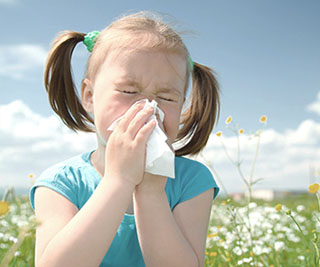What is an allergy?
An allergy is a hypersensitivity disorder of the immune system to substances which are naturally harmless and tolerated by a healthy individual. The exceeded defensive reaction triggers in inflammatory processes, causing typical symptoms like shortness of breath, itchy and watery eyes, blocked and runny nose, and sneezing. Today about a third of the population is affected by some kind of allergic disorder.
Typical symptoms for an allergy
• Eyes: itchiness, tears, reddening, swelling
• Nose: itchiness, sneezing, swelling of the mucous membranes
• Bronchia: coughing, dyspnoea
• Skin: eczema, welts, itchiness, reddening
Cross-sensitivity
An allergic cross-sensitivity is caused by similar or closely related proteins. As a consequence a patient can become sensitive to several different allergens. For example, food related allergies are often initially caused by an allergic reaction to pollen. The chemical structure of certain pollen allergens is very similar to the structure of some food allergens, thus triggering an equal immune response.
Anaphylaxis
Anaphylaxis is a severe form of an allergic reaction with effect on the whole body, including several different organ systems. Anaphylaxis is a severe, potentially life-threatening systemic adverse event. The anaphylactic reaction generally occurs within a short time after contact with the allergen, even tiniest amounts of allergen can cause the anaphylactic reaction. Symptoms range from skin reactions or gastrointestinal problems to respiratory distress, drop in blood pressure and circulatory collapse. Anaphylaxis can lead to death within minutes!















